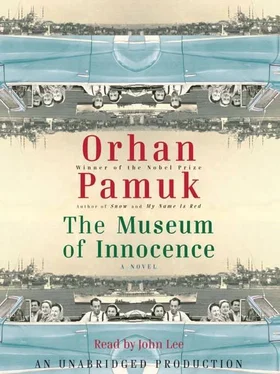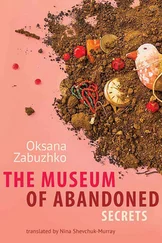Ever since Şaziment had (at last) managed to marry off her elder daughter to the Karahan boy, they’d stopped going to ski in Uludağ every February, preferring to spend a month in Switzerland with the rest of the Karahan clan, and taking Şaziment’s younger daughter with them. This younger daughter had found herself a rich Arab prince who was staying in the same hotel, and Şaziment had almost succeeded in marrying her off as well when it emerged that the prince had another wife back in his own country-a harem, even. As for the Halis family of Ayvalık, their eldest son-“You remember, the one with the longest chin,” said my mother with a laugh, which I could not help sharing-my mother had heard from Esat Bey, her neighbor in Suadiye, that the boy had been caught on a winter’s day at their summer house in Erenköy with the German nanny. The eldest son of Maruf the tobacco king-when we were children, we’d played together with shovels and pails in the sandboxes of city parks-had been kidnapped by terrorists, a development my mother was shocked to learn I had not heard about, not even when he was released following the payment of a ransom. Yes, they’d managed to keep the matter from the press, but because the family had been so slow to cough up the money, everyone had been “scandalized” for months on end by the matter-so how could I not have heard?
I was worried that my mother might have intended this question as a dig about my visits to Füsun’s family; maybe she was remembering that whenever I came home on summer evenings with wet swimming trunks, and both she and Fatma Hanım would ask whom I’d gone swimming with, how I’d reply, “I’m working very hard, Mother dear,” and try to change the subject (as if it had eluded my mother what dreadful shape Satsat was in). It made me sad that after nine years I’d still found no ways of intimating to my mother my obsessive love for Füsun, let alone confiding in her; I would long for her to tell me another pointless story so that I could forget my troubles. One night she described in great detail about how Cemile Hanım, whom I’d seen at the Majestic Garden Cinema with Füsun and Feridun many summers ago, being no longer able to afford the upkeep on her eighty-year-old mansion, had, like Mükerrem Hanım, another of my mother’s friends, taken to renting it out to producers of historic melodramas, only to see “that huge, lovely mansion” burned down, ostensibly due to faulty electrical equipment during filming, though everyone knew the family had deliberately set the fire to erect an apartment building in the mansion’s place. The narrative was so vivid that I was in no doubt about my mother’s full awareness of my close ties to the film world, the particulars of which Osman must have furnished her.
Though I’d been amused to read in the papers about Melikhan, the former foreign minister, who had taken a fall having caught his foot on a carpet at a ball and died two days later of a brain hemorrhage, my mother didn’t mention it, fearing perhaps that it might remind me of Sibel and the engagement. There were other pieces of news that my mother saw fit to withhold, but that I’d heard from Basri, the Nişantaşı barber. It was he, for instance, who informed me that my father’s friend Fasih Fahir and his wife, Zarife, had bought a house in Bodrum; that Sabih the Bear was actually a very decent person “underneath it all;” that gold was actually a foolish investment right now; that prices were bound to fall; that there would be a lot of fixing at the horse races that summer; that even without a hair left on his head, the famously wealthy Turgay Bey, out of attachment to the habits of a gentleman, still came in for regular haircuts; that two years ago Basri had been offered the Hilton concession, but being a “man of principle” (the meaning of which he did not elaborate) he had declined-and in this same spirit proceeded to ply me for any information I might have on this and that. It would irritate me to realize that Basri and all his rich Nişantaşı clients knew all about my obsession for Füsun, and lest I give them more to gossip about, I would sometimes go to Cevat, my father’s old barber in Beyoğlu, and from him I would hear tales of the Beyoğlu hoodlums (by now referred to as the mafia) and the film world. It was from him, for example, that I heard of Papatya’s involvement with Muzaffer, the famous producer. None of my sources, however, talked to me about Sibel or Zaim, or about Mehmet and Nurcihan’s wedding. From this, if nothing else, I should have deduced the universal awareness of my sorrow and suffering, but I didn’t: My informants’ tact seemed as natural to me as their oft-repeated indiscreet accounts of all the bankers going bankrupt, stories I always welcomed.
It was two years earlier, at the office and also from friends, that I’d begun to hear about all the bankers who’d gone bankrupt, and all the investors who’d lost their fortunes-stories I enjoyed because they proved the utter brainlessness of the Istanbul rich, not to mention their slave masters in Ankara. For her part, my mother relished saying, “Your dear departed father always did insist that no one should trust those conniving bankers!”-a subject she warmed to since, unlike so many others in our circle, we’d not fallen prey to them. (Though I sometimes suspected that Osman had secretly invested some of the profits from his new ventures with them.) My mother felt bad for any friends who’d been fleeced-Kadri the Sieve, whose beautiful daughter she had once hoped I would marry, Cüneyt Bey and Feyzan Hanım, Cevdet Bey and his family, the Pamuks-but when it came to the Lerzans, she would profess amazement that they should have consigned their entire fortune to a “so-called banker” who was the son of an accountant in one of their own factories (and who had worked his way up from security guard), a man who had only recently risen from the shantytowns with no financial credentials, but with an office of some sort, an advertisement on TV, and a checking account with a reputable bank. Closing her eyes as if she would faint and shaking her head half in jest, she would say, “They could at least have gone to someone like Kastelli, who’s so close to those actor friends of yours.” I would never dwell on the subject of my actor friends; when she marveled that “sensible, reasonable people” (including, as readers will recall, Zaim) could be so harebrained, I would enjoy chiming in.
Tarık Bey numbered among those my mother dismissed as stupid. He had invested money with Kastelli the banker, who had hired so many of the famous actors we knew from the Pelür to appear in his commercials. When Tarık Bey had admitted losses two years earlier, I’d assumed them to be small, as he gave no indication of serious suffering or hardship.
On Friday, March 9, 1984, two months after Füsun got her driver’s license, when Çetin dropped me off at the house in Çukurcuma at suppertime, I saw that all the windows and curtains were open, and the lights were on upstairs and downstairs, this despite Aunt Nesibe’s perennial upset at the waste of electricity when a single light was left on upstairs at suppertime; without fail, she would say, “Füsun, my girl, the bedroom light’s still on,” and without delay Füsun would go straight upstairs to turn it off.
Steeling myself for a family quarrel between Feridun and Füsun, I went upstairs. No one was seated at the table where we’d eaten supper for so many years, nor could I see any food. The television was on, and sitting before it were two neighbors-an old lady and her husband-who seemed at a loss as to what to do. Out of the corners of their eyes they were watching our actor friend Ekrem Bey, who, dressed as the grand vizier, was making a speech about infidels.
“Kemal Bey,” said the neighbor, Efe the electrician. “Tarık Bey has passed away. Please accept our condolences.”
Читать дальше












